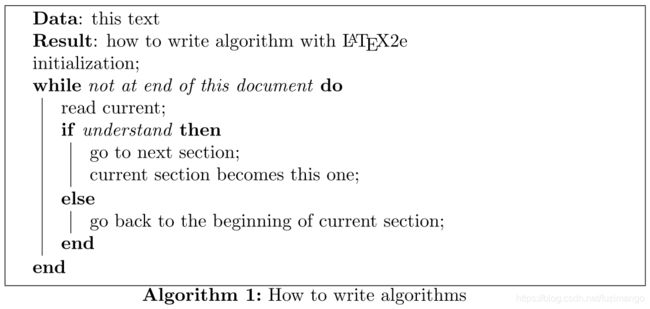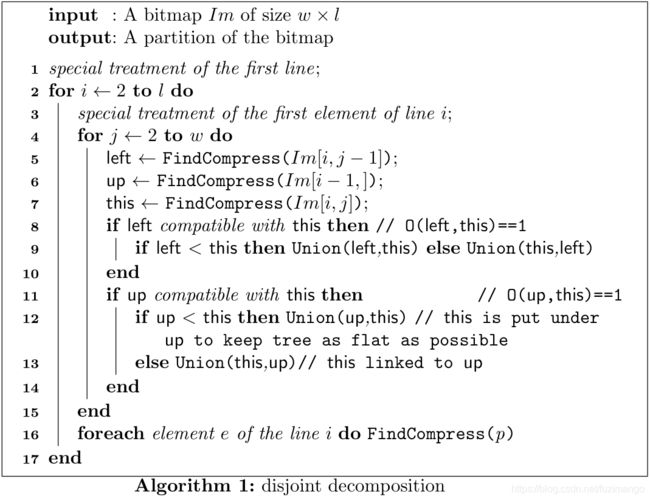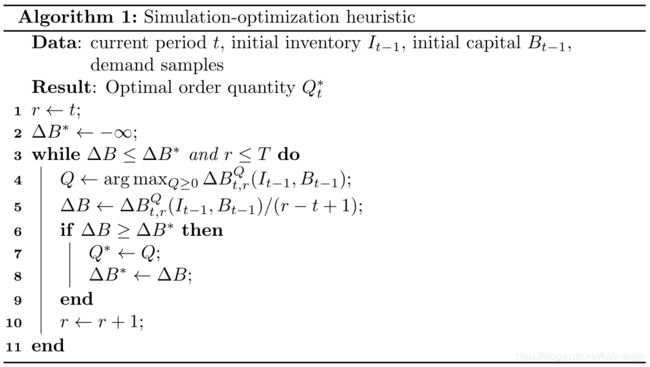用 Latex 生成英文论文中的 算法步骤/伪代码 并插入 word 中
准备工作:
1、先安装 CTEX https://mirrors.tuna.tsinghua.edu.cn/ctex/legacy/2.9/
2、下载 algorithm2e 包(里面有详细的使用说明文档) https://www.ctan.org/tex-archive/macros/latex/contrib/algorithm2e
这个其实 CTEX里已经包含了,不过不是最新的。想要最新版和一些官方提供的例子可以在 CTAN 下载 algorithm2e 包 (也就是上面的链接),下载完之后要解压到 "C:\CTEX\MiKTeX\doc\latex\algorithm2e" 和 "C:\CTEX\MiKTeX\tex\latex\algorithm2e",然后要 运行 "开始菜单 -> Ctex -> Settings(Admin) -> Refresh FNDB"
3、安装 Inkspace (将生成的 算法步骤图/伪代码.pdf 转成能导入word的格式)https://inkscape.org/release/inkscape-0.92.4/
好吧,开始操作~~~
装好 CTEX 后,打开 "开始菜单 -> Ctex -> WinEdt",新建一个 file
总的来说创建一个 latex 伪代码文件 需遵循格式:
\def\SetClass{article}
\documentclass{\SetClass}
\usepackage[格式]{algorithm2e}
\begin{document}
算法内容
\end{document}我们直接贴几个例子:
注意编译的时候 选 "PDFTeX",然后点 Accessories 里的 Compile
例子1:
这个例子来源于官方说明文档
\def\SetClass{article}
\documentclass{\SetClass}
\usepackage[lined,boxed,commentsnumbered]{algorithm2e}
\begin{document}
\begin{algorithm}[H]
\SetAlgoLined
\KwData{this text}
\KwResult{how to write algorithm with \LaTeX2e }
initialization\;
\While{not at end of this document}{
read current\;
\eIf{understand}{
go to next section\;
current section becomes this one\;
}{
go back to the beginning of current section\;
}
}
\caption{How to write algorithms}
\end{algorithm}
\end{document} 例子2:
这个例子也是官方说明文档里的
\def\SetClass{article}
\documentclass{\SetClass}
\usepackage[linesnumbered,lined,boxed,commentsnumbered]{algorithm2e}
\begin{document}
\IncMargin{1em}
\begin{algorithm}
\SetKwData{Left}{left}\SetKwData{This}{this}\SetKwData{Up}{up}
\SetKwFunction{Union}{Union}\SetKwFunction{FindCompress}{FindCompress}
\SetKwInOut{Input}{input}\SetKwInOut{Output}{output}
\Input{A bitmap $Im$ of size $w\times l$}
\Output{A partition of the bitmap}
\BlankLine
\emph{special treatment of the first line}\;
\For{$i\leftarrow 2$ \KwTo $l$}{
\emph{special treatment of the first element of line $i$}\;
\For{$j\leftarrow 2$ \KwTo $w$}{\label{forins}
\Left$\leftarrow$ \FindCompress{$Im[i,j-1]$}\;
\Up$\leftarrow$ \FindCompress{$Im[i-1,]$}\;
\This$\leftarrow$ \FindCompress{$Im[i,j]$}\;
\If(\tcp*[h]{O(\Left,\This)==1}){\Left compatible with \This}{\label{lt}
\lIf{\Left $<$ \This}{\Union{\Left,\This}}
\lElse{\Union{\This,\Left}}
}
\If(\tcp*[f]{O(\Up,\This)==1}){\Up compatible with \This}{\label{ut}
\lIf{\Up $<$ \This}{\Union{\Up,\This}}
\tcp{\This is put under \Up to keep tree as flat as possible}\label{cmt}
\lElse{\Union{\This,\Up}}\tcp*[h]{\This linked to \Up}\label{lelse}
}
}
\lForEach{element $e$ of the line $i$}{\FindCompress{p}}
}
\caption{disjoint decomposition}\label{algo_disjdecomp}
\end{algorithm}\DecMargin{1em}
\end{document} 例子3:
这个例子来源于博客,而且博主对其中的一些用法给出了一些说明,详见 https://blog.csdn.net/robert_chen1988/article/details/71512914
\def\SetClass{article}
\documentclass{\SetClass}
\usepackage[ruled,linesnumbered]{algorithm2e}
\begin{document}
\begin{algorithm}
\caption{Simulation-optimization heuristic}\label{algorithm}
\KwData{current period $t$, initial inventory $I_{t-1}$, initial capital $B_{t-1}$, demand samples}
\KwResult{Optimal order quantity $Q^{\ast}_{t}$}
$r\leftarrow t$\;
$\Delta B^{\ast}\leftarrow -\infty$\;
\While{$\Delta B\leq \Delta B^{\ast}$ and $r\leq T$}{$Q\leftarrow\arg\max_{Q\geq 0}\Delta B^{Q}_{t,r}(I_{t-1},B_{t-1})$\;
$\Delta B\leftarrow \Delta B^{Q}_{t,r}(I_{t-1},B_{t-1})/(r-t+1)$\;
\If{$\Delta B\geq \Delta B^{\ast}$}{$Q^{\ast}\leftarrow Q$\;
$\Delta B^{\ast}\leftarrow \Delta B$\;}
$r\leftarrow r+1$\;}
\end{algorithm}
\end{document}
转格式
好了,最后一步就是将生成的 PDF 转成我们需要的格式了,打开 Inkspace 转就完事了,这里不详细说了~


